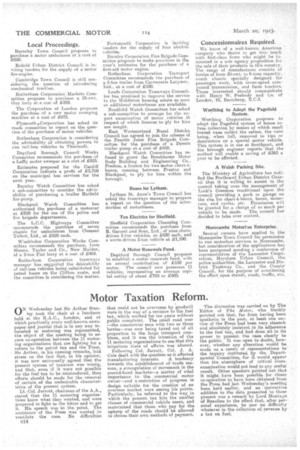Motor Taxation Reform.
Page 6

If you've noticed an error in this article please click here to report it so we can fix it.
Wednesday last Sir Arthur Stan
ley took the chair at a luncheon held at the R.A.C., London, and at which practically every well-known newspaper -and journal that is in any way interested in motoring was represented, the object of the meeting being to secure co-operation between the 11 motoring organizations that are fighting for a return to the petrol tax and the Press. Sir Arthur, in his opening remarks, laid stress on the fact that, in his opinion, it was now universally agreed that the present system of taxation was wrong, and that, even, if it were not possible for the fuel tax to be reintroduced, then efforts should be made for the removal of certain of the undesirable characteristics of the present system.
Lt.-Col. Jarrott, chairman of the A.A., stated that the 11 motoring organizations knew what they wanted, and were prepared to fight to the bitter end to get it. His speech was to the point. The assistance of the Press was wanted to ventilate the case. No difficulties 014 that could not be overcome by goodwill were in the way of a revision to the fuel tax, which worked for ten years without public complaint. The small road user —the commercial man with two or three lorries—was now being taxed out of all proportion to the large transport combines, and it was the intention of the 11 motoring organizations to see that this iniquitous state of affairs was altered.
Following Col. Jarrett, Col. J. A. 'Cole dealt with the question as it affected manufacturing interests. A tendency towards the establishment oftrade seasons, a strangulation of movement in the second-hand markets—a matter of vital importance to the commercial motor owner—and a restriction of progress in design suitable for the creation of an overseas market were among his points. Particularly, he referred to the way in which the present tax hits the smaller classes of commercial vehicle users, and maintained that those who pay for the upkeep of the roads should be allowed to choose their own methods of payment.
The discussion was carried on by The Editor of The Motor, who frankly pointed out that, far from having been apathetic in the past, at least one section of the Press had been very staunch and absolutely insistent in its adherence to the fuel tax, and had done all in its power to present the ease clearly to the public. It was open to doubt, however, whether any alteration would be made aa a. result of representations to the inquiry instituted by. the Departmental Committee, for it would appear that the atmosphere of critical crossexamination would not lead to any useful result. Other speakers pointed' out that it might have been possible for closer co-operation to have been obtained from the Press had last Wednesday's meeting been held earlier, and an instructive addition to the data presented to those present was a remark by Lord Montagu. of Beaulieu to the effect that, after personal experience, he saw no difficulty whatever in the collection of revenue by a tax on fuel.




















































